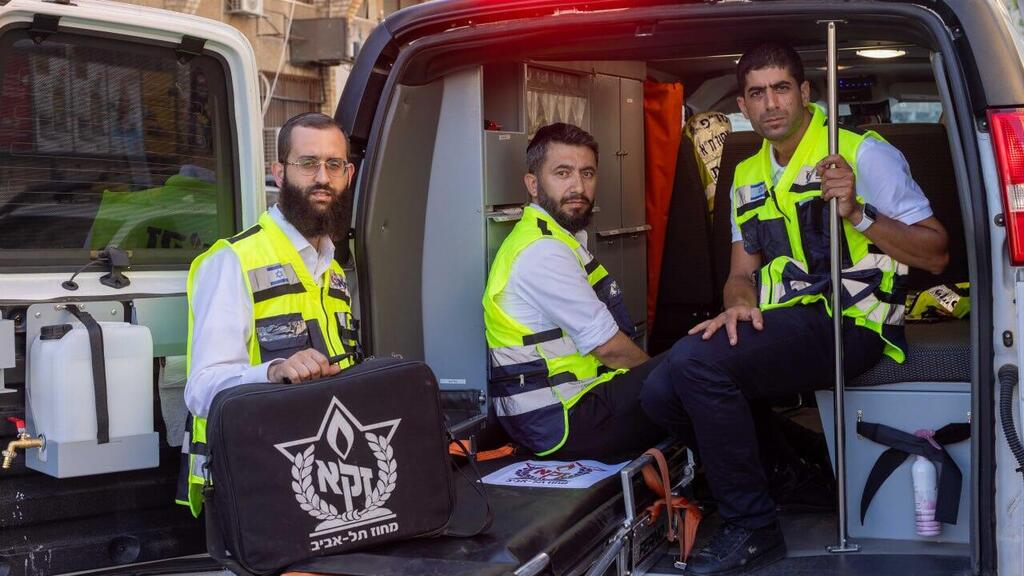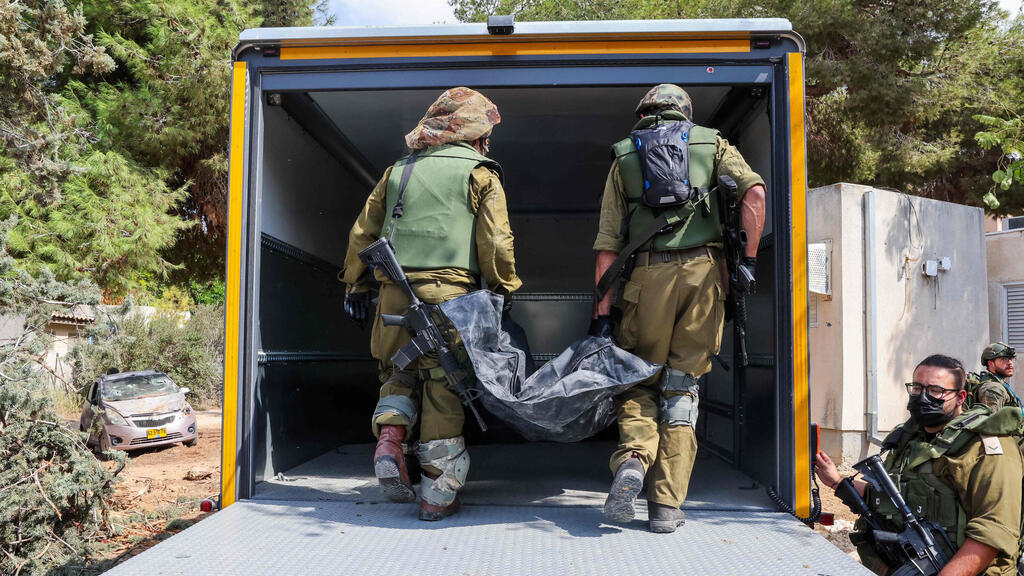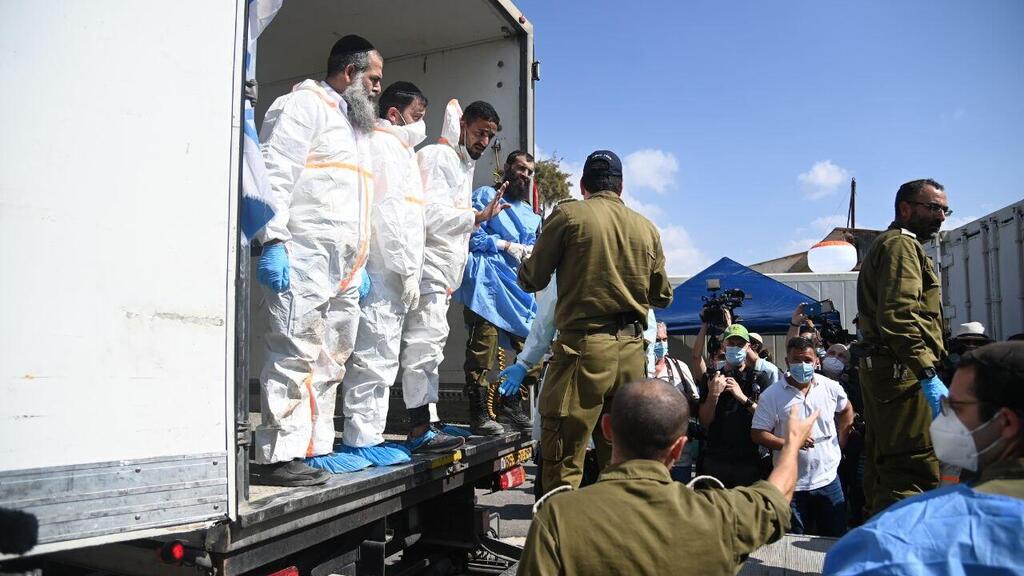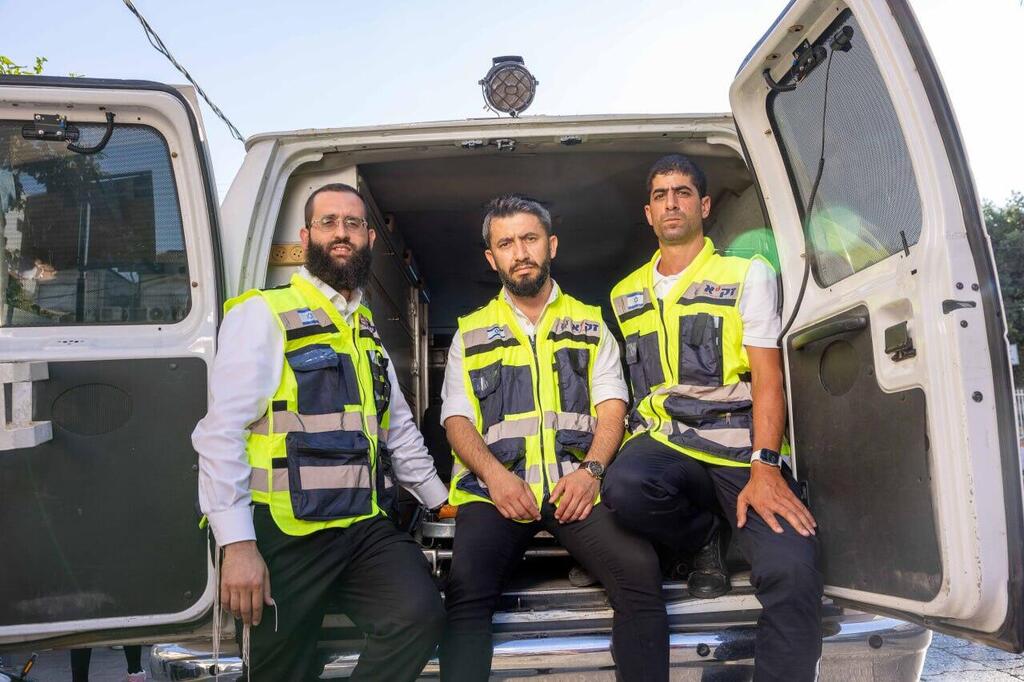Getting your Trinity Audio player ready...
Two hundred ZAKA search and rescue volunteers were at the IDF’s Shura base in the weeks following October 7, all by choice. When they arrived at the base on the evening of the massacre, they had no idea what they were about to face.
Some 1,200 bodies were brought there from the carnage in the Gaza border area. Entire families were murdered in their homes. Youth who only wanted to dance. Truckloads of lives taken with endless cruelty.
They stayed there for a month and a half, and even though time has passed since, the images and smells continue to haunt them. "The smell doesn't leave your body for a long time," describes Ariel Chazkiev, who was part of the team at the base.
"You're somewhere nice, and suddenly you smell it and you’re back there. When we opened the body bags, we saw how cruel people can really be. They showed no mercy to anyone. We're not looking for people to tell us, 'You're heroes.' But it’s important to understand that this stays with us to this day and will always stay with us,” he said.
"You can't erase what we saw there," said Elchanan Shachaf, a ZAKA volunteer. "It's something a normal person’s mind can’t handle. When I started volunteering with ZAKA, I asked the veterans for tips, and they told me, 'Try not to look at a person’s face so you won’t dream about them.'
“But in those days when we were identifying the bodied, you had to look, had to check faces. There were times in the identification rooms when I said, 'Stop, that’s enough, I can't handle this.'"
"I remember how they brought in an entire family that had been murdered," Chazkiev recalled. "I lifted their son, a beautiful child. It hurt me so much. I have children too, and I looked at this situation from a father’s perspective. That child still doesn’t leave my mind."
"We saw things there that you can’t even imagine. Insane cruelty," said Ariel Yazdi, who has been volunteering with ZAKA for 13 years. The case of Ruth and Arik Peretz especially shook him.
"A father took his daughter to a party, and they were murdered together. It was very difficult to identify them. At 2 a.m., after almost 40 hours being awake, we discovered they were killed while hugging." During those days at the base, he also started smoking. "They told me that I wouldn’t smell anything if smoked. Now I’m smoking a pack and a half a day."
'It's getting worse over time'
Time doesn’t heal their distress, and the need for support and rehabilitation only grows. "At the start of the war, I didn’t go to work for almost two months," Yazdi recounted. "No one accompanied or supported us or our families in any way. They used us during the war, worked us whenever possible — day, night and on weekends. When it ended, no one recognized us.”
"I distance myself from my close surroundings because my mind isn't functioning, I have no patience, and it’s getting worse over time. During those days at Shura, we were working, we were together, we were each other’s strength. We had a mission. Now, there’s nothing,” he added.
“You wake up in the morning, go to work, come home, eat, pretend like everything's okay — but we’re scarred. I ask myself if I'll return to who I was 10 months ago, and I don’t know the answer to that. There's no one who comes to you, hugs you and explains how you can cope with this. I see a truck on the street, and I get a flash of 30 bodies arriving. It’s imprinted on your soul."
"I pushed a lot aside; there was a long period when I didn't sleep," Shachaf shared. "I asked my wife if she noticed I was getting more irritated with the kids, that I had a short fuse. I told her I didn't want to be that kind of father."
When asked how they continue working in this field despite the challenges, all three respond that it’s about a sense of duty. "We're not looking for gratitude," Chazkiev explained. "When someone works in the medical field and successfully saves someone’s life, there’s a family that hugs them and thanks them. There’s no gratitude here; it’s purely for the sake of this holy work. That’s our motivation."
Since October 7, ZAKA’s core operations have centered at the Shura base and the National Institute of Forensic Medicine, alongside volunteers stationed in the Gaza border area, mainly working to collect evidence.
"Working at Shura means dealing with the essence of cruelty, investigating the horror," ZAKA CEO Zvi Hassid said. "The National Insurance Institute provided one-time funding after October 7 meant for treatments, and there was also an option for a few sessions with a professional from the Health Ministry.”
“This is a band-aid solution, but it’s not thorough or long-term treatment. We cover a significant portion of the volunteers’ treatment costs,” he added.
Last week, the conclusions of the Finance Ministry’s public committee for aiding those affected by October 7 were published, "without a single word said about ZAKA volunteers," Hassid said. "I personally sent them a request to explain what’s happening with the volunteers, but they don’t see us as people who require treatments.”
“It’s clear that ZAKA volunteers' work has an impact on their mental health, but the system doesn’t recognize that we're a part of this,” he added. “These are people with families, parents with children. It can manifest in things like outbursts at home. Additionally, mental health affects the body, and it’s about the volunteers' health. It’s our responsibility as an organization and as a society to take care of them."






